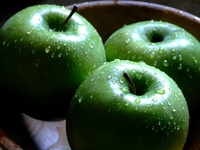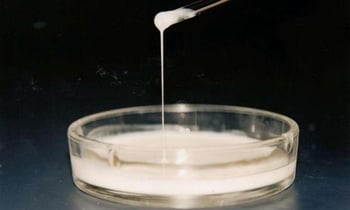 Organic fruits and vegetables are gaining ground in the food industry as a healthy alternative to produce that may have been grown with harmful pesticides and other chemicals. Unfortunately, however, this lack of chemical additives sometimes leaves organic produce susceptible to food-borne pathogens and microbes, which can cause illness in humans.
Organic fruits and vegetables are gaining ground in the food industry as a healthy alternative to produce that may have been grown with harmful pesticides and other chemicals. Unfortunately, however, this lack of chemical additives sometimes leaves organic produce susceptible to food-borne pathogens and microbes, which can cause illness in humans.
Tags: Washington, food science, WA, WSU, Washington State University, 2015, biotech, Northwest Region, Pullman, BioResearch Product Faire™
 Microbiologists at Oregon State University have discovered and are licensing a new type of natural polymer dairy or food thickener called Ropy 352.
Microbiologists at Oregon State University have discovered and are licensing a new type of natural polymer dairy or food thickener called Ropy 352.
Tags: Bioresearch, Oregon State University, food science, Microbiology, Oregon, 2015, BioResearch Product Faire Event, OR, Corvallis, Northwest Region, ORSTU
 Everyone wants to live healthier, if only to avoid the distress and danger of having serious problems like diabetes and blocked arteries. Unfortunately that's not always enough to get Americans to eat better, even when they know what's at stake. Last month a much publicized study in the New England Journal of Medicine confirmed that a "Mediterranean diet" is a clear winner for heart health, but try wrestling a steak away from a Texan with the lure of olive oil, nuts, and fruit instead. That's why University of Texas Health Science Center San Antonio (UTHSCSA) research scientist Reto Asmis is studying the biochemical basis of the Mediterranean diet with the aim of producing a food supplement that does what the healthy diet does without a wholesale change in our eating behavior.
Everyone wants to live healthier, if only to avoid the distress and danger of having serious problems like diabetes and blocked arteries. Unfortunately that's not always enough to get Americans to eat better, even when they know what's at stake. Last month a much publicized study in the New England Journal of Medicine confirmed that a "Mediterranean diet" is a clear winner for heart health, but try wrestling a steak away from a Texan with the lure of olive oil, nuts, and fruit instead. That's why University of Texas Health Science Center San Antonio (UTHSCSA) research scientist Reto Asmis is studying the biochemical basis of the Mediterranean diet with the aim of producing a food supplement that does what the healthy diet does without a wholesale change in our eating behavior.
Tags: 2014, 2013, cardiovascular research, heart disease, food science, Mediterranean Diet, University of Texas, Translational Research, Texas, Southwest, UT Health Science Center San Antonio, UTxSA, University of Texas Health Science Center, BioResearch Product Faire Event, San Antonio, TX
Americans are making, drinking, and exporting more wine than ever before. A hobby for some and serious business for others, winemaking consumes a whole lot of grapes every year (in the neighborhood of 4 million tons in the US alone), and that number is growing. But as with any type of industry, there's a certain industrial waste to be managed. In the case of winemaking, it's called pomace, and up to now vintners have been paying to have the pulpy mass hauled away. Now food science researchers at Oregon State University in Corvallis have come up with a process to make pomace into useful products, from biodegradable fiberboard to a nutritional foodstuff, which is the kind of earth-friendly, business-savvy research from which OSU is likely to profit nicely when the technology is commercialized internationally.
Tags: 2014, 2013, Oregon State University, food science, Wine Grape Pulp, Northwest, Oregon, BioResearch Product Faire Event, Research, Front Line event, OR, Corvallis, Corvalis, ORSTU, Pomace

